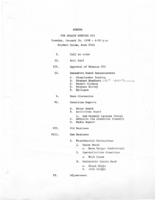Search the Special Collections and Archives Portal
Search Results

Catherine Abrigo oral history interview: transcript
Date
Archival Collection
Description
Oral history interview with Cathrine Abrigo conducted by Cecilia Winchell and Stefani Evans on July 20, 2022 for the Reflections: the Las Vegas Asian American and Pacific Islander Oral History Project. In this interview, Abrigo describes her early life in the Philippines, where she attended Catholic school and briefly studied medical technology in college. She describes immigrating to Las Vegas, Nevada with her husband and the difficulty of leaving her immediate family behind. She discusses working for the Cosmopolitan in 2011 and becoming deeply involved with the Culinary Workers Union Local 226. Throughout the interview, Abrigo talks about religion, food, and her activism with the Culinary Union.
Text

Meeting minutes for Consolidated Student Senate, University of Nevada, Las Vegas, January 24, 1978
Date
Archival Collection
Description
Text

Interview with Stephen Craig Ronshaugen, November 26, 2004
Date
Archival Collection
Description
Text

Marisa Rodriguez oral history interview: transcript
Date
Archival Collection
Description
Oral history interview with Marisa Rodriguez conducted by Maribel Estrada Calderón, Monserrath Hernández and Claytee D. White for the Latinx Voices of Southern Nevada Oral History Project. Marisa Rodriguez discusses her childhood and living in North Las Vegas as a teenager; she was born in Chicago, Illinois, moved to Mexico with her family at a young age, and returned to the United States at age 12. She recounts what it was like acclimating to American life, learning English, and studying abroad in Spain before becoming a law student. Marisa attended the William S. Boyd School of Law and is currently a civil litigator in Las Vegas. Subjects discussed include: La Voz Hispanic/Latino Law Students Association at the William S. Boyd School of Law; Huellas mentorship program.
Text

Magdalena Martinez oral history interview: transcript
Date
Archival Collection
Description
Oral history interview with Magdalena Martinez conducted by Monserrath Hernandez and Barbara Tabach on April 4, 2019 for the Latinx Voices of Southern Nevada Oral History Project. In this interview, Magdalena Martinez recalls her childhood and growing up in Los Angeles, California. Martinez's parents are from Durango, Mexico, and immigrated to the United States in the 1970s. Martinez describes the generational differences that the women in her family faced and how the feminist movement of the 1970s did not resonate with women of color. Her family moved to Las Vegas in 1986 where she attended Bishop Gorman High School. After transferring to the University of Nevada, Las Vegas (UNLV) from community college and joining a student organization that would later become Student Organization of Latinxs, she became an early member of the Latino Youth Leadership Conference (LYLC) sponsored by the Latin Chamber of Commerce. Martinez describes how the LYLC has evolved over the years, and talks about her role in those changes. She discusses past work for CSN, NSHE, and currently is the Director of Education Programs with the Lincy Institute.
Text

Transcript of interview with Jacob Snow by Stefani Evans and Claytee White, August 29, 2016
Date
Archival Collection
Description
In recalling his career in the public sector, Boulder City native Jacob Snow credits fellow Nevadans Robert Broadbent and Bruce Woodbury as two mentors who helped shape his world view. After attending Boulder City schools and serving a religious mission in Hong Kong, earning his Bachelor's and Master's degrees at Brigham Young University, and working as community development planner for the City of Provo, Utah, 1987-1989, Snow has lived and worked in Clark County. Snow's degrees in geography and urban planning and his experience in transportation directly benefited Clark County residents from 1989 through 2015; we continue to derive indirect advantage of his knowledge through his current consulting business. In this interview, he speaks to the ways infrastructure accommodated Southern Nevada's growth. He discusses McCarran's Terminal Three, the Las Vegas Monorail, UNLV's football stadium, the Bruce Woodbury Beltway, and the Fremont Street Experience. He explains the ethos of McCarran Airport; why the Monorail will likely never go to McCarran Airport; how Clark County financed the CC-2015 Bruce Woodbury Beltway, and why we see the concept of "complete streets" applied more in the City of Las Vegas and the City of Henderson than in Clark County. Snow discusses his work under Clark County director of aviation Broadbent as assistant director of aviation for planning at McCarran International Airport; his career as general manager of the Regional Transportation Commission, where he worked with Clark County Commissioner Bruce Woodbury, and his three years as city manager for the City of Henderson. In speaking of all three roles, Snow draws upon his knowledge of transportation as it grew and was shaped by his previous positions. And in all three roles, Snow exemplifies the lesson Broadbent impressed upon him early in his airport career: "[Y]ou've got to be able to bury the hatchet and build bridges.
Text

Transcript of interview with Thomas Rodriguez by Maribel Estrada Calderón, September 10, 2018
Date
Archival Collection
Description
Known for “raising hell and making a difference” in the Las Vegas Valley, Thomas Rodriguez has dedicated more than four decades of his life to the political, educational, and social advancement of the Latinx community. Tom was born in 1940 to Jennie Gomez and Joseph Rodriguez in a Topeka, Kansas neighborhood its residents called The Bottoms. Mexicans, Mexican Americans, American Indians, African Americans, among other peoples lived in this diverse and beloved community. In 1956, the Urban Renewal Program, a program funded by the Federal Government that sought to raze neighborhoods the city considered to be “slums,” forced The Bottoms’ residents to abandon their homes. Rodriguez recalled the effects that this event had on his family and on his educational career. Despite his family’s relocation, he graduated from a high school located in a nearby neighborhood in 1958. Years later, the activism and ideology of the Chicano Movement of the 1960s taught Rodriguez that to overcome the injus
Text

Patricia Vazquez interview, November 14, 2018, June 14, 2019: transcript
Date
Archival Collection
Description
Session 1: Interviewed by Marcela Rodriguez-Campo. Barbara Tabach also participates in the questioning. Session 2: Interviewed by Rodrigo Vazquez. Monserrath Hernandez also participates in the questioning. Patricia Vazquez was born and raised in Las Vegas, NV and shares her experiences growing up in the Valley as a Queer Latina. At a young age, she remembers traveling back and forth between Mexico and the U.S. to visit family. When she started school she shares how her home language, Spanish, became her family's "secret language" as she began to learn English. During elementary school Patricia was tracked into the special education program, and remove from the mainstream classroom. She would find her love for learning in books and libraries as she taught herself how to read in English. Despite being tracked into less advanced courses, Patricia would end up taking AP/ Honors courses in high school after forging her favorite teachers signature, which changed her educational trajectory. After coming out to her family, Patricia went nearly a decade distanced from her mother and continued her college education at Arizona State University. There, she would complete a bachelors in painting and a masters in comparative literature. Her work with the Chicano Studies program at ASU helped her develop her Chicana identity and begin her involvement in social activism. In Las Vegas, she worked to fight for marriage equality and LGBTQ rights with the American Civil Liberties Union , and later with the Progressive Leadership Alliance of Nevada. She also conducted several lectures for the Latino Youth Leadership Conference on sexuality, gender, and homophobia for over a decade. She has served as an English Professor at the College of Southern Nevada for the last 20 years and is an avid hiker, traveler, and painter.
Text

Transcript of interview with Thelma Coblentz by Judith Chavez, February 17, 1980
Date
Archival Collection
Description
On February 17, 1980, Judith Chavez interviewed Thelma Coblentz (born 1911 in New Jersey) about her experiences in Southern Nevada. Coblentz first talks about her move to Lovelock, Nevada, where her husband provided medical care as one of the first physicians in the small town. She later talks about her move to Las Vegas and some of the services she helped to provide at Nellis Air Force Base. Coblentz later describes Downtown Las Vegas, specifically the development of the casinos and shopping businesses. She later talks about the rainstorms and dust storms that the city would experience before recalling some of the entertainers who would perform on the Las Vegas Strip. The interview concludes with a discussion on the first physicians in Las Vegas and the increasing population of the city.
Text

Transcript of interview with Rory Reid by Stefani Evans and Claytee White, July 13, 2017
Date
Archival Collection
Description
Rory Reid works in the Downtown Las Vegas building fully tattooed with a mural depicting a hand holding a bouquet of flowers of which the glowing central bloom is half brain and half heart. The story behind the mural is essential to understanding why the oldest of Landra and Harry Reid’s five children loves coming to work. Born in Alexandria, Virginia, he arrived in Las Vegas as a six-month-old with his parents and led a story-book life in the Reid house on Gretel Circle, down the street from Hansel Circle and right off Lilliput Lane. After attending Doris Hancock Elementary School, James Cashman Junior High School, and Ed W. Clark High School, he served a church mission in Argentina and studied international relations and Spanish and then law at Brigham Young University before returning to Las Vegas and joining Lionel Sawyer and Collins law firm. In this interview, Reid talks about administrative law, about leaving the firm to become an executive with Lady Luck Gaming Corporation, serving as Nevada Democratic Party chair for two years, and returning to Lionel Sawyer and Collins in 2000, where he remained until 2014. He shares his motivations for running for the District G seat on the Clark County Commission in 2002, and talks about the political climate in which he took office in 2003, a few months before fellow Commissioners Dario Herrera; Lance Malone; Erin Kenny, and chair Mary Kincaid Chauncey were indicted on federal charges following Operation G Sting. Following these highly public arrests, Reid focused on restoring faith in local government. In 2010, after two terms as Clark County Commissioner and Commission chair, Reid ran for Governor of Nevada as the Democratic nominee against Brian Sandoval. In that election, as Reid puts it, "the voters told me to do something else with my life," and he returned to his law practice. However, in June of 2014, his dear friend Jim Rogers passed away. The day after Rogers died Reid discovered that he was named co-trustee of Rogers's estate, along with his widow, Beverly. Reid and Beverly Rogers together founded The Rogers Foundation to be the primary advocate for public education in Nevada. The Rogers Foundation is housed in Downtown Las Vegas in the building tattooed with the bouquet. The mural-the Wall of Understanding-is The Rogers Foundation's answer to political calls for "building a wall" and a show of solidarity with the students they serve, many of whom are undocumented immigrants or have undocumented immigrant family members. For the man who helped restore the reputation of Clark County government and who emphatically declines to run for further public office, fulfilling the mission and the work of The Rogers Foundation is one of his greatest joys-along with his family; his beagle, Oakey; and watching Liverpool compete in the English Premier League (especially when Liverpool plays his brother's favorite team, Manchester United).
Text
